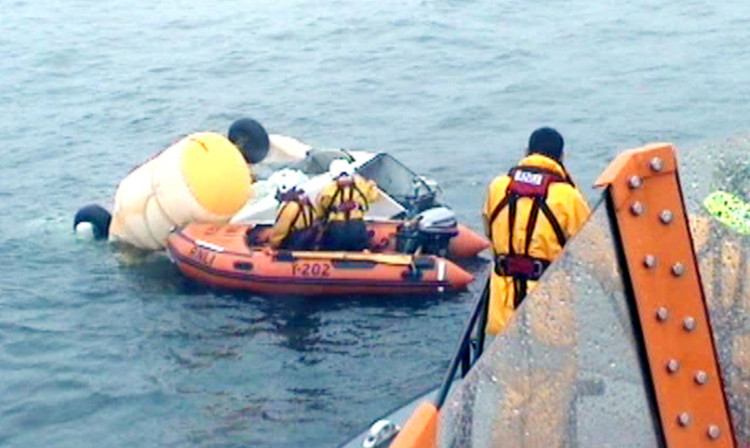Investigators will try to establish what caused a helicopter to plunge into the North Sea, killing four oil workers, after the wreckage was recovered from the water.
The Super Puma was carrying 16 passengers and two crew from the Borgsten Dolphin platform when it crashed into the sea off Shetland on Friday evening, killing three men and one woman.
Helicopter experts believe more people could have died in the crash if it had not been for the “skill of the pilots”.
“It is too early to say exactly what happened, but ditching a helicopter on water is extremely difficult,” a spokesman for the British Airline Pilots Association said.
“The skill of the pilots in dealing with what looks to have been a catastrophic power failure at low altitude almost certainly ensured that more people didn’t lose their lives.”
It is not yet known what caused the CHC-operated helicopter to ditch as it approached Sumburgh airport on the southern tip of the main island.
Rescuers recovered three bodies in the aftermath of the incident and the fourth was removed from the wreckage on Sunday. Two of the 14 survivors remain in hospital.
Tributes have been paid to the victims, named as Duncan Munro, 46, from Bishop Auckland, County Durham; George Allison, 57, from Winchester, Sarah Darnley, 45, from Elgin; and 59-year-old Gary McCrossan, from Inverness.
Misty conditions on Sunday night hampered efforts to salvage the wreckage and transport it back to shore for examination by a team from the Air Accidents Investigation Branch (AAIB).
It is understood that the remains of the Super Puma AS332 L2 were eventually lifted on to the deck of the vessel Bibby Polaris which was due to travel to a mainland port.
It is hoped information on the helicopter’s black box recorder will help establish the cause of the crash.
Shetland coastguard manager John Webster said: “The heavy-lift ship is out at the moment trying to recover what wreckage it can from the sea. After that the AAIB will decide where to take it.”
All Super Puma flights to and from UK offshore installations have been suspended, prompting a meeting of oil and gas industry chiefs today to discuss the impact on platform workers.
CHC has grounded the model involved in the crash and suspended all UK flights of three other Super Puma types.
Fellow operators Bond Offshore Helicopters and Bristow have also enforced a temporary suspension of all Super Puma flights except emergency rescue missions.
It follows a recommendation by the offshore industry’s Helicopter Safety Steering Group (HSSG) which urged the precautionary measure until there is “sufficient factual information” to resume flights.
The HSSG is made up of representatives from oil and gas firms, contractors, helicopter operators, offshore unions, the Health and Safety Executive (HSE) and the Civil Aviation Authority (CAA).
The group will meet again on Wednesday to review the suspension unless it becomes aware of any “significant” information before then.
Industry body Oil & Gas UK has arranged a meeting of operators and major contractors in Aberdeen today to discuss ways of minimising the impact of the grounding of flights on the offshore workforce.
Hundreds of workers are flown to and from oil platforms every day and there are concerns that the grounding of the Super Puma will cause a backlog of workers waiting to go on and offshore.
Scotland’s Finance Secretary John Swinney said the government did not anticipate that the temporary suspension would have any immediate impact on North Sea production but that the situation would be closely monitored.
The helicopter chartered by oil firm Total contained one staff member and the remainder, including those killed, were all working for contractors.
Mr Munro leaves behind wife Penny and 12-year-old daughter Katie.
His family said his death would “leave a large void in a lot of people’s lives.”
Ms Darnley’s parents and sister paid tribute to a “fun-loving, free spirit” who lived life to the full and would be sorely missed.
Mr McCrossan worked for Stork Technical Services. Mike Mann, a senior vice-president at the firm, said: “Our heartfelt condolences go out to Gary’s family and to all of those affected by this tragedy.”
Mr Allison had been working at the Offshore Dunbar Platform as a project safety supervisor for just over a year when he was killed, according to his LinkedIn profile.
He described himself as a “highly qualified, experienced and competent safety adviser” who had worked in the offshore industry for 27 years.
There have been five North Sea incidents involving Super Pumas since 2009. In April that year an AS332 L2, this time operated by Bond, went down north east of Peterhead on its return from a BP platform, killing all 14 passengers and two crew on board.
The other three ditchings involved the EC225 model which saw flights temporarily suspended. CHC returned the model to commercial service only earlier this month.
An investigation by the Air Accidents Investigation Branch found that two of the incidents were the result of gearbox failure and new advice on checks for the EC225 were issued as a result.
A fatal accident inquiry is expected to be held into the 2009 fatal AS332 L2 crash in Aberdeen next year.
Both types are produced by global helicopter manufacturing group Eurocopter, part of the European Aeronautic Defence and Space Company.
The company said it was “supporting CHC and relevant authorities with their investigations”.
Pat Rafferty, Scottish secretary of the Unite union, said: “This is the fifth major incident in the last four years involving Super Puma helicopters in the UK offshore industry and the second resulting in fatalities. It’s unacceptable and it can’t go on.”
